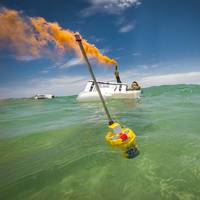Maritime Safety: ACR, Ocean Signal Develop New EPIRB with Integrated AIS

ACR Electronics and Ocean Signal announced the development of next generation EPIRBs.Introducing integrated AIS (Automatic Identification System) within their EPIRBs for the first time in conjunction with further new technology, ACR and Ocean Signal will launch the advanced beacons this year ahead of the enforcement of new updated IMO (International Maritime Organization) Maritime Safety Committee EPIRB regulations.AIS EPIRBs will offer both recreational and commercial users the extra reassurance that other nearby vessels will be notified in an emergency…
Work‘bots’: Autonomous Vessels Arrive
The near-shore and inland workboat fleet is at the leading edge for autonomous vessel developmentWhile the advent of autonomous workboats are not exactly mainstream, you better believe that in the not-too-distant future they will be a reality on waterways in and around the U.S. Today there remain more questions than answers, particularly on the legal, logistics and insurance side of the coin. But the technology is evolving at record pace, providing many in the industry with mixed emotions. Excitement. Controversy. Curiosity. Skepticism. These are just a few of thoughts, and emotions that arise to any mention of the topic of autonomous vessels.It’s happening now.
Helm Report Says Workboat, OSV Safety Compromised
Some 50% of crews working on offshore support vessels are willing to compromise safety rather than say ‘no’ to clients or senior management, while nearly 80% believe commercial pressures could influence the safety of their working practices. The chilling findings, released to coincide with this week’s International Maritime Organization Maritime Safety Committee meeting, come from a new report on workboat and OSV safety commissioned by operations and maintenance management software specialist Helm Operations. ‘The Impact of Crew Engagement and Organizational Culture on Maritime Safety in the Workboats and OSV Sectors’ is the first maritime safety study specific to workboats and OSVs and will be finalized in time for World Maritime Day 2015, on September 26.
MCA Publish DP Relative Positioning Guidance
The International Marine Contractors Association (IMCA) has published “Guidance on RADius Relative Positioning System” (IMCA M 224) describing the RADius microwave radar system. The development of dynamic positioning (DP) systems has grown over the past 35 years, with reliable and robust methods of positioning essential for safe vessel operations at offshore installations. This growth has in turn stimulated the development of DP position measurement sensors which have become more sophisticated as technology has allowed. “This new document is produced by IMCA as an aid to members and others using position reference systems and forms part of a series of documents on the available systems,” explains IMCA’s Technical Director, Jane Bugler.
Castrol Calls for Clarity on Polar Lubricants Usage
As Polar shipping movements increase, Castrol Marine suggests that greater attention should be paid to the environmental credentials of lubricants used on board in applications where there is a risk of leakages and discharges. Growing demand for effective shipping routes and cruises to previously inaccessible destinations has led vessels into increasingly sensitive marine areas. Exemplary is the increasing amount of seaborne traffic beginning to move along the Siberian coast. There are also hopes of opening up more of the North West Passage above Canada. The Northern Sea Route voyage is one-third of the distance of traditional routes through the Suez Canal, bringing with it lower fuel costs.
Marshall Islands Register Grows 29 Percent
The Marshall Islands register announced that its fleet has grown 29 percent in tonnage terms, or 4 million gross tons (gt), over the past 12 months in a mid-year report released. At the mid-year point of June 30, 2003, there are 569 ships totalling 17.69 million gt flying the Marshall Islands flag, in contrast to the 429 ships of 13.69 million gt on the register on June 30, 2002. The Marshall Islands flag has been one of the fastest growing registries in the world in recent years, and the latest figures show that this trend is continuing. In April 2003, for example, almost 1 million gt of new ships was registered with the Marshall Islands, just short of a record monthly total for the flag.






